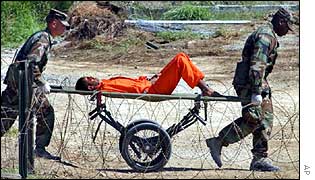 |
World Truths |
 |
 |
World Truths |
 |
|
Human rights 'suffer in
terror crackdown'
Tuesday, 28 May, 2002, 12:50 GMT 13:50 UK

Amnesty says the US is setting a bad example
Amnesty International says human rights have been eroded around
the world following the attacks against the United States on 11
September.
The group raises concern over the rights of terror suspects, pointing out that hundreds of Arabs are now being held without trial in the US.
Its 300-page annual report says some states have exploited the global anti-terror campaign to stifle political dissent at home. Amnesty argues that justice, not revenge, should guide the response to the terror attacks on the US. "The year 2001 witnessed a direct challenge to long-accepted human rights standards by the very governments that campaigned for their establishment," the group writes. The conflict in Afghanistan has put in question "international legal standards in practice for decades", it says. 'Green light for repression' At least 1,100 individuals have been detained in the US since the attacks but only a handful have been charged with any crime. William F Schulz, executive director of Amnesty International USA, said the US had set the lead for other governments and therefore had to face up to its responsibilities.
"Citizens around the world suffer the consequences when the US defaults on its responsibility to promote human rights," he said. Washington's war on terror had provided a "de facto green light for other nations to ignore fundamental human rights standards", said Mr Schulz. The organisation also criticises the US's refusal to classify al-Qaeda and Taleban suspects being held at Guantanamo Bay, Cuba, as prisoners-of-war and its apparent readiness to try them at military tribunals. "The treatment of detainees in Guantanamo appears to have prompted some governments to believe that the inhumane treatment of prisoners is now acceptable," it writes. Washington regards the detainees as suspected terrorists, not legitimate soldiers. The US is by no means the only state to come under fire in Amnesty's global review of the year:
'Racist backlash' Amnesty also accuses the US along with South Korea, Jordan and Britain of introducing anti-terror legislation which undermines human rights. Britain, for example, now has a law to detain foreign nationals without charge or trial while the US can hold foreigners facing deportation indefinitely.
"A racist backlash has generated a climate of suspicion and mistrust exaggerated by the way in which foreigners are being portrayed as a source of 'terrorism'," the report says. China is accused of repressing minorities under the banner of fighting terrorism. Amnesty detects a trend in a number of countries to portray foreigners, particularly refugees and asylum-seekers, as terrorists. The group's Secretary General, Irene Khan, singled out Australia's treatment of illegal immigrants, saying Canberra had "exploited the security hype" in order to turn refugees away. Elsewhere in the report, Amnesty says that there has been a decrease in the number of nations using torture on prisoners, from 90% in 2000 to 73% last year. It also reports that the number of states using the death penalty has fallen from 40 countries in 1997 to 27 last year.
|